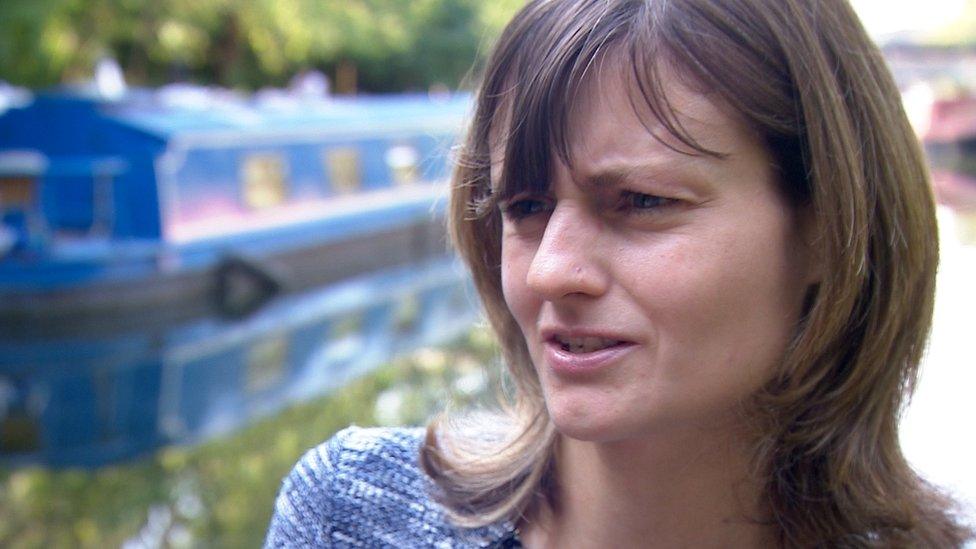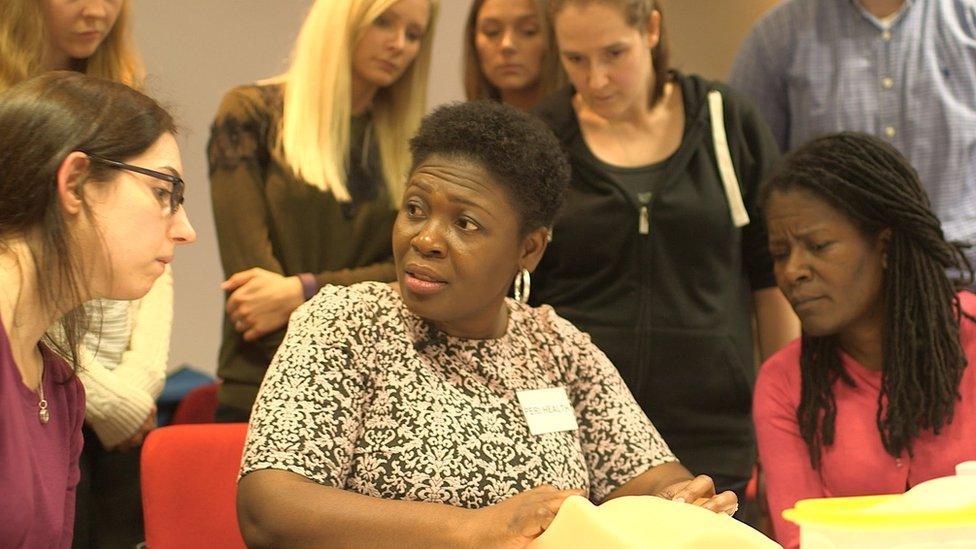The hidden trauma of being torn during childbirth
- Published
Debbie has had to wear a colostomy bag since her tear and goes out less than she used to
The problem of women being injured in childbirth has for years been exacerbated by poor diagnosis, improper care and an unwillingness to speak about the issue, experts say. Two women, who have suffered both physically and psychologically, want to change this.
Six years after Debbie gave birth to her son Kaiden, she has lost count of how many hospital appointments she's had.
During childbirth, she suffered a fourth-degree perineal tear, resulting in damage to the anus and the muscle that controls it.
It is the most serious level of tear, and left Debbie requiring emergency surgery.
"I tore basically from the vagina to the back passage, all the way along - and when I went into surgery, they found it had cut into the bowel," she tells the BBC's Victoria Derbyshire programme.

Find out more
The Victoria Derbyshire programme is broadcast on weekdays between 09:00 and 11:00 on BBC Two and the BBC News channel.

Surgeons repaired the tear, but Debbie was left with a small hole between the wall of her vagina and her bowel, eventually requiring her to be fitted with a colostomy bag.
This has had an immense effect on her way of life. Debbie, who says she used to be outgoing, now prefers to stay indoors where possible.
"Everything changes. I have to consider it everywhere I go. If I leave the house, I take spare clothes, I have to scan places for the nearest toilet."
But the effects of the tear are not just physical. Debbie suffers from depression and her relationship with Kaiden's father broke down a year after the birth.
"My confidence is very low," she explains. "I wouldn't say it's changed my personality completely, but I don't have any confidence.
"Confidence is about putting on clothes, walking out of the house and feeling lovely - I don't really get that."
Others have reported that embarrassment at their condition, or similar issues over confidence, have caused them to leave their job.

Jenny questioned her ability to bring up her son
One study in the British Journal of Gynaecology (BJOG) suggests 85% of women have some form of tear during their first vaginal birth.
The number of women suffering severe third and fourth-degree tears tripled from 2% to 6% between 2000 and 2012, according to BJOG.
The rise has been put down to tears being better diagnosed - but also women giving birth later in life and to heavier babies.
Long-term complications can include urinary and anal incontinence and painful sex.
Even in the the most severe cases, however, the tears can be treated effectively with early intervention.
But many women suffer in silence - embarrassed to seek help, or unsure whether their symptoms are normal after giving birth. And often when they do seek help, they are ignored or told by their doctors that their symptoms are to be expected and will improve.
'Devastated'
Jenny suffered a third-degree tear during childbirth. She was left without sensation in her bladder and nerve damage, which causes her pain.
"I remember doing my first walk with a pram. I was able to walk for 10 minutes and then I remember sitting on the kerb and saying to my mum, 'I can't actually walk any further.' That's a really clear memory for me."
She says she was told by doctors that the pain was to be expected after having a baby and - at one point - that it "was all in my head".
She remembers thinking: "Where am I going to get help for this because nobody believes me?"
Jenny was affected by post-natal depression, questioning her ability to bring up her child as a single parent.
"I didn't feel like I had anything left in me to love or to mother," she explains.
"I just felt so devastated by what had happened to me. The trauma of it all wrapped up in a parcel was just overwhelming."
Jenny says the experience has completely changed her sense of self. Her son now lives with his father.
'More control'
Professionals are looking at ways to reduce the likelihood of perineal tears occurring during vaginal births.
In a joint project between the Royal College of Obstetricians and Gynaecologists and the Royal College of Midwives - the first time doctors and midwives have teamed up to work together on this area of care - a new technique has been developed that those behind it say reduces the risk of a serious tear, by preventing the weakest point of the perineum from being damaged in delivery.
Over the next two years, more than a dozen hospitals are set to adopt the techniques.
Specialist perineal midwife Adelaide Aduboffour also believes medical professionals need more training on how to repair tears, describing the current level of care as "quite patchy" and not standardised.

Adelaide Aduboffour is calling for better training in preventing and repairing perineal tears
"If 10 women are going to have a baby and eight of them or nine of them are likely to have a trauma, then we need mandatory training across the board."
She has started her own training course on perineal suturing for midwives, junior doctors and students, which she hopes will one day be available on the NHS.
Her students certainly seem to see the need for it. Many of those on the course say they feel unprepared by the training they have previously received - one says she was taught for just an hour on the subject.
For Ms Aduboffour, the course is important because "if we don't get this right it means it's affecting women's general way of life, affecting their relationships".
For Jenny, developments in understanding of the condition cannot come soon enough.
"I've lost a lot," she says.
"And it's really hard to think that if I had more knowledge about birth, and perhaps been given a bit more control, how different it could have been."
The Victoria Derbyshire programme is broadcast on weekdays between 09:00 and 11:00 on BBC Two and the BBC News channel.